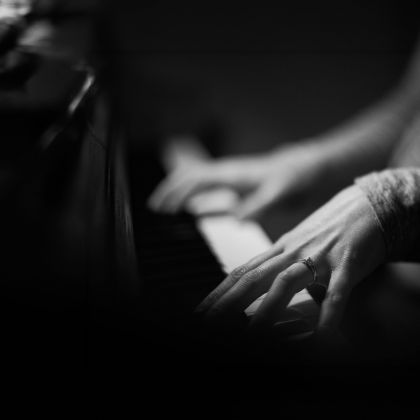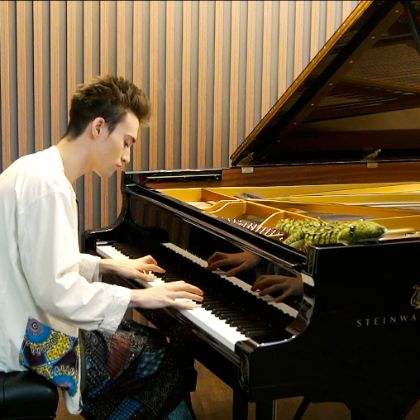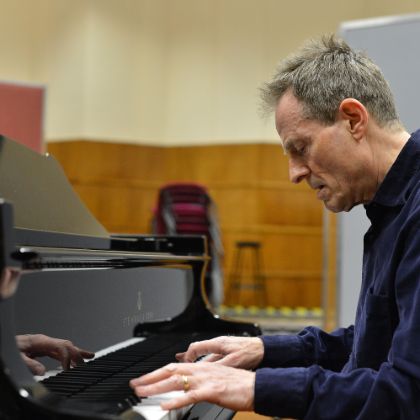Listen Magazine Feature
Baseball may have won out, but the piano abides.
By Fay Vincent
Ingo Hoffman is now around seventy years old, and in his field he is the best. He is an old-school master piano tuner. The legendary humorist-cum-pianist Victor Borge used to insist that Ingo tune his piano during the intermissions of his performances. Borge, classically trained, could hear the tiny alterations in tone produced by the intense heat of the lights during the first half of his show; Ingo would adjust the piano in the few minutes between acts. I have come to know and value Ingo, and his visits to tune my piano are learning events.
As I sit across the living room while he works, I ask Ingo whether he could teach anyone — even me — to tune a piano. ‘Yes,’ he replies.
His father, who once tuned for Sergei Rachmaninoff in Vienna, trained Ingo rigorously, demanding that his son master the construction of the piano before learning to tune one. Ingo tells me that the felt in my 1936 Steinway is the original. “The felt in this piano cannot be duplicated today, and it makes a difference in the sound,” Ingo explains. “This is Scottish felt, and for some reason it is no longer available. Perhaps the sheep are different.” I purchased the piano from Ingo several years ago, so he knows it well. To him, my piano is an old friend, his visits to it like returns to his childhood neighborhood. He knows where this piano spent much of its life — “an elderly woman on Park Avenue owned it and I took care of it” — and was pleased when he found a welcoming new home for it.
Ingo has tuned pianos for such luminaries as Arthur Rubinstein, Marian McPartland, George Shearing and Leonard Bernstein. He speaks fondly of each of them, though none was able to tune a piano. As I sit across the living room while he works, I ask Ingo whether he could teach anyone — even me — to tune a piano. “Yes,” he replies. “I think anyone can be taught. Of course, they have to have a basic ear for the sounds, but one does not have to be musical or skilled.” I ask if he has trained successors, and he confesses he has not. He has often been asked to set up programs to train tuners, he says, but nothing has come of it. Ingo is thus one of a dying breed. A master of the piano, he works alone, with no apprentice to watch him gently tugging on the tuning wrench to loosen or tighten the strings.
He tells me the action on my piano has become stiff from underuse and urges me to find ways to have the piano played more often. I feel the shame of not having continued my lessons as my mother wished. Baseball won out. Watching him work, I can appreciate the ancient art in which he has been trained. Indeed, he tells me he worked for Mr. Steinway, who brought Ingo to this country to ensure the quality of the pianos being constructed in his eponymous New York factory. And while Ingo is proud of the current Steinways, he laments there are no longer any of his generation of craftsmen, whose work has been baked into the very piano he is tuning.
When he finishes, Ingo washes himself in the sound of the instrument, gently playing several short pieces. He says he plays poorly, but to my ear the growling bass notes and clear ringing treble seem freshly minted. He seems to agree, and I am certain he enjoys playing notes he has just ensured are pure and precise. It is my pleasure to watch this fine gentleman relax and enjoy a job well done, and when he finishes, I feel the sadness of knowing he has no successor.
My piano lessons begin next week.
Fay Vincent served as the eighth commissioner of Major League Baseball from 1989–1992.
This article originally appeared in Listen: Life with Music & Culture, Steinway & Sons’ award-winning magazine.
related...
-

Practice, Practice, Practice
Steinway Artists on the Rewards of Routine
by Laura Lee Smith
Read More -

Steinway Artist - Jacob Collier: Little Blue
Read More -

Steinway Artist - John Paul Jones
John Paul Jones (born John Baldwin on January 3, 1946) became a prolific music director and arranger of a range of prominent Sixties artists before forming Led Zeppelin with Jimmy Page in 1968. Since 1980, the multi-instrumentalist embarked on a solo career, and his collaborators have included the supergroup Them Crooked Vultures as well as Paul McCartney, Brian Eno, and Diamanda Galas.
Read More